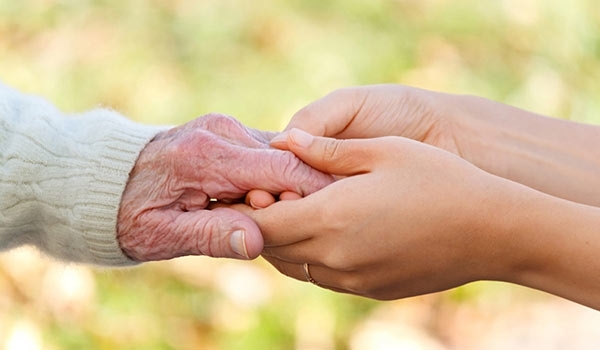23. A man should not call his father by his name nor sit down before him nor walk in front of him
44. Abu Hurayra saw two men and said to one of them, “Who is this man in relation to you?” He is
my father,” he replied. He said, “Do not call him by his own name nor walk in front of him nor sit
down before him.”
24. Can a man call his father by his kunya?
45. Shahr ibn Hawshab said, “We went out with Ibn ‘Umar and Salim said to him, ‘Peace, Abu
‘Abdu’r-Rahman.'”
46. ‘Abdullah ibn Dinar said reported that Ibn ‘Umar said, “But Abu Hafs ‘Umar decided…”
II. Ties of Kinship
25. The Duty of maintaining ties of kinship
47. Kulayb ibn Manfa’a reported that his grandfather asked, “Messenger of Allah, towards whom
should I be dutiful?” He replied, “Your mother, your father, your sister and your brother. Then your
mawla (client) has the next right against you and then your relatives who are connected.”
48. Abu Hurayra said, “When the following ayat was revealed (‘Warn your near relatives’ (26:214)),
the Prophet, may Allah bless him and grant him peace, stood up and called out, saying, ‘Banu Ka’b ibn Lu’ayy! Save yourselves from the Fire! Banu ‘Abdu Manaf! Save yourselves from the Fire! Banu
Hashim! Save yourselves from the Fire! Banu ‘Abdu’l-Muttalib! Save yourselves from the Fire!
Fatima, daughter of Muhammad! Save yourselves from the Fire! I do not have anything for you in
respect to Allah except for the fact that you have ties of kinship.'”
26. Maintaining ties of kinship
49. Abu Ayyub al-Ansari told him that a bedouin came to the Prophet, may Allah bless him and grant him peace, while he was travelling. He asked, “Tell me what will bring me near to the Garden and keep me far from the Fire.” He replied, “Worship Allah and do not associate anything with Him,
perform the prayer, pay zakat, and maintain ties of kinship.”
50. Abu Hurayra reported that the Messenger of Allah, may Allah bless him and grant him peace, said,”Allah Almighty created creation. When He had finished it, ties of kinship rose up. Allah said, ‘Stop!’
They said, ‘This is the place for anyone seeking refuge with You from being cut off’ Allah said, ‘Are
you not content that I should maintain connections with the one who maintains connection with you and I should cut off the one who cuts you off?’ It replied, ‘Yes indeed, my Lord.’ He said, ‘You have that.'”
Then Abu Hurayra said, “If you wish, you can recite, ‘Is it not likely that, if you did turn away, you
would cause corruption in the earth and sever your ties of kinship?‘ (47:22)”
51. Ibn ‘Abbas spoke about the ayat, “Give your relatives their due, and the very poor and
travellers” (17:26), and said, “He begins by commanding the most pressing of the obligatory dues
and He directs us to the best action if we have any money. He says: ‘Give your relatives their due, and the very poor and travellers.’ He also teaches us what we can say if we have nothing. He says, ‘But if you do turn away from them, seeking the mercy you hope for from your Lord, then speak to them with words that bring them ease’ (17:28) in the form of an excellent promise. Things are as they are, but they might change if Allah wills. ‘Do not keep your hand chained to your neck’ and not give anything, ‘but do not extend it either to its full extent’ and give all you have, ‘so that you sit there blamed’ as those who come to you later and find you have nothing will blame you, ‘and destitute.’ (17:29)” He said, “The person to whom you have given everything has made you destitute.”
27. The excellence of maintaining ties of kinship
52. Abu Hurayra said, “A man came to the Prophet, may Allah bless him and grant him peace, and
said, ‘Messenger of Allah! I have relatives with whom I maintain ties while they cut me off. I am good to them while they are bad to me. They behave foolishly towards me while I am forbearing towards them.’ The Prophet said, ‘If things are as you said, it is as if you were putting hot ashes on them and you will not lack a supporter against them from Allah as long as you continue to do that.'”
53. ‘Abdu’r-Rahman ibn ‘Awf heard the Messenger of Allah, may Allah bless him and grant him
peace, say, “Allah, the Almighty and Exalted, said, ‘I am the Merciful (ar-Rahman). I have created ties
of kinship and derives a name for it from My Name. If anyone maintains ties of kinship, I maintain
connection with him, and I shall cut off anyone who cuts them off.'”
54. Abu’l-‘Anbas said, “I visited ‘Abdullah ibn ‘Amr at al-Waht (some land of his in Ta’if). He said,
‘The Prophet, may Allah bless him and grant him peace, pointed his finger towards us and said,
“Kinship (rahim) us derived from the All-Merciful (Rahman). When someone maintains the
connections of ties of kinship, they maintain connection with him. If someone cuts them off, they cut him off. They will have an unfettered, eloquent tongue on the Day of Rising.”‘”
55. ‘A’isha reported that the Prophet, may Allah bless him and grant him peace, said, “Kinship (rahim) is derived from Allah. If anyone maintains ties of kinship Allah maintains ties with him. If anyone cuts them off, Allah cuts him off.”
28. Maintaining ties of kinship will prolong life
56. Anas ibn Malik reported that the Messenger of Allah, may Allah bless him and grant him peace,
said, “Anyone who wants to have his provision expanded and his term of life prolonged should
maintain ties of kinship.”
57. Abu Hurayra heard that the Messenger of Allah, may Allah bless him and grant him peace, say,
“Anyone who wants to have his provision expanded and his term of life lengthened should maintain
ties of kinship.”
29. Allah loves the one who maintains ties of kinship
58. Ibn ‘Umar said, “If someone fears his Lord and maintains ties of kinship, his term of life will be
prolonged, he will have abundant wealth and his people will love him.”
59. Ibn ‘Umar said, “If someone his Lord and maintains ties of kinship, his term of life will be
prolonged, his wealth will be abundant and his family will love him.”
30. Being dutiful to the closest relative and then the next closest
60. It is reported that al–Miqdam ibn Ma’dikarib heard the Messenger of Allah, may Allah bless him
and grant him peace, say, “Allah enjoins you to be dutiful to your mothers. Then He enjoins you to be dutiful to your mothers. Then He enjoins you to be dutiful to your fathers. Then He enjoins you to be dutiful to your next closest relative and then to your next closest relative.”
61. Abu Ayyub Sulayman, the mawla of ‘Uthman ibn ‘Affan, said, “Abu Hurayra came to us on a
Thursday evening, the night before Jumu’a. He said, ‘Every individual who severs ties of kinship is
constricted when he leaves us. No one left until he had said that three times. Then a young man went to one of his paternal aunts with whom he had severed ties two years previously. He went to her and she asked him, ‘Nephew! What has brought you?’ He replied, ‘I heard Abu Hurayra say such–and such.’ She said, ‘Go back to him and ask him why he said that.’ Abu Hurayra said, ‘I heard the Prophet,may Allah bless him and grant him peace, say, “The actions of the children of Adam are presented before Allah Almighty on Thursday evening, the night before Jumu’a. He does not accept the actions of someone who has severed ties of kinship.”‘”
62. Ibn ‘Umar said, “Nothing that a man spends on himself and his family, anticipating a reward from Allah, will fail to be rewarded by Allah Almighty. He should begin with those whose support is his responsibility. If there is something left over, he should spend it on his next nearest relative and then the next nearest. If there is still something left over, he can give it away.”
31. Mercy will not descend on people when there is someone among them who severs
ties of kinship
63. ‘Abdullah ibn ‘Awfa reported that the Prophet, may Allah bless him and grant him peace, said,
“Mercy does not descend on a people when there is someone among them who severs ties of kinship.”
32. The wrong action of someone who severs ties of kinship
64. Jubayr ibn Mu’tim reported that he heard the Messenger of Allah, may Allah bless him and grant
him peace, say, “The one who severs ties of kinship will not enter the Garden.”
65. Abu Hurayra reported that the Messenger of Allah, may Allah bless him and grant him peace, said,”Ties of kinship (rahim) is derived from the All–Merciful (ar–Rahman). They say. ‘My Lord! I have
been wronged! My Lord! I have been cut off! My Lord! I have! I have!’ Allah answers them, ‘Are
you not content that I cut off the one who cuts you off and I maintain connections with the one who
maintains connections with you?'”
66. Sa’id ibn Sam’an heard Abu Hurayra seeking refuge from the power of children and fools. Sa’id
said, “Ibn Hasana al–Juhani told me that he asked Abu Hurayra, ‘What is the token of that?’ He
replied, ‘That he severs ties of kinship, obeys someone who is in error, and disobeys the correct
guide.'”
33. The punishment of someone who cuts off ties of kinship in this world
67. Abu Bakra reported that the Messenger of Allah, may Allah bless him and grant him peace, said,
“There is no wrong action which Allah is swifter to punish in this world – in addition to the
punishment which He has stored up for the wrongdoer in the Next World – than cutting off ties of
kinship and injustice.”
34. The one who maintains ties of kinship is not the one who reciprocates
68. ‘Abdullah ibn ‘Amr reported that the Prophet, may Allah bless him and grant him peace, said, “The one who maintains ties of kinship is not the one who reciprocates. The one who maintains ties of kinship is the one who, when his relatives cut him off, maintains ties of kinship.”
35. The excellence of someone who maintains relations with relatives who are unjust
69. Al–Bara’ said, “A bedouin came and said, ‘Prophet of Allah! Teach me an action which will enable
me to enter the Garden.’ He said, “The question is a broad one, even though you have asked it in only a few words. Free someone. Set a slave free.’ He said, ‘Are they not the same thing?’ ‘No,’ he replied,’Freeing someone is setting someone free yourself. Setting a slave free is to contribute to the price of setting him free. Lend an animal for milking which has a lot of milk and treat your relatives kindly. If you cannot do that, then command the good and forbid the bad. If you cannot do that, then restrain your tongue from everything except what is good.”
36. Those who maintained ties of kinship in the Jahiliyya and then became Muslim
70. Hakim ibn Hizam said to the Prophet, may Allah bless him and grant him peace, “Do you think
that the acts of worship which I used to do in the time of the Jahiliyya – maintaining relations with
relatives, setting slaves free and sadaqa – will bring me a reward?” Hakim said that the Messenger of
Allah, may Allah bless him and grant him peace, said, “When you become Muslim, you keep the good actions you have already done.”



